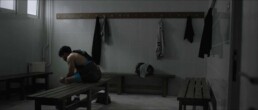'A Good Day Will Come' Review: An Athlete Wrestles with Political Backlash
A prominent Iranian athlete is torn between his professional and political obligations in filmmaker Amir Zargara's A Good Day Will Come. Inspired by true events surrounding wrestler Navid Afkari's unjust execution during the 2018 Iranian protests, Zargara's film shows the moral dilemma at the heart of conflicting responsibilities. Winner of "Best Canadian Short Film" at the Vancouver Short Film Festival, A Good Day Will Come qualifies for the 2025 Academy Awards.
An Athlete Wrestles with Defending His Country or Remaining Silent
Sia Alipour plays Arash, a professional wrestler whose Olympic dreams seem within reach. He aspires to represent his country, Iran, at the future Olympic Games and has the skills to back it up. However, his gold medal ambitions come to a halt once he realizes the state of turmoil and injustice his fellow Iranians find themselves in. Arash cannot ignore the suffering and decides to make a grand political gesture to bring attention to the cause. He chooses to use his platform to stand up to tyranny instead of remaining silent, but doing so puts a target on his back that he cannot escape.
Wrestling gives Arash a sense of control. With the right moves and techniques, he can beat his opponents with relative ease. It's a sport he knows he can win. In the real world, however, Arash cannot harness control. His fate remains at the mercy of government officials, which is a sobering reality check for Arash, who realizes that wrestling only gives him an illusion of control. By speaking up and becoming politically active, he is doing what he can to take back the reins of his own life.
Capturing the Feeling of Oppression Onscreen
Visually, the film incorporates a moody color palette that feels indicative of the theme of oppression. Cinematographer Jelan Maxwell offers gritty and dynamic compositions that express so much without the need for dialogue. Of course, Sia Alipour brings the film to life as Arash. His performance is fiercely strong while also being empathetic. Iranian-Canadian writer and director Amir Zargara infuses his own musings of resilience into the script which makes for an impactful and moving experience.
Takeaway
With seven wins and sixteen nominations, A Good Day Will Come is leaving quite a mark on the film festival circuit. The Iranian wrestler Navid Afkari once said “Our only power lies in our united voice”. This short film tells a heartbreaking story about an inspirational figure whose brave actions continue to be a guiding light in the fight against injustice.
'Saturn' Review: This Indie Sci-Fi Asks, 'Will You Answer the Call?'
A father is faced with making the ultimate sacrifice in director Eric Esau's intergenerational and intergalactic sci-fi film, Saturn. Torn between saving his family and saving the world, Saturn is an intimate drama that reckons with both deep-rooted trauma and family secrets. With a highly cinematic aesthetic made on an independent film budget, Saturn proves that its Marvel-level quality doesn't need deep pockets to be effective.
A Superhero Faces an Unthinkable Ultimatum
The life of the shepherd is a life of sacrifice, and no one knows that better than James (Dominic Bogart). James is part of a secret community of superhuman heroes called Shepherds who are responsible for protecting the planets. Like the Avengers, James is among several people who will be called upon in times of crisis. Unfortunately, that time is now. For years, he has been able to keep his superpowers a secret from his wife Sarah (Piercey Dalton) and their young son George (Elijah Maximus). The closest James gets to galactic gestures is teaching a college class on wormholes.
However, when a mysterious planet appears overnight that is in line to catastrophically collide with Earth, James realizes that he may not be able to avoid his shepherding obligations any longer. Once he reaches this conclusion, the conflicting internal battle begins. James struggles with his next move, as each holds devastating consequences. Should he choose to stay with his family, essentially welcoming the apocalypse that will undoubtedly destroy the Earth? Or should he live up to his ancient and honorable duty and sacrifice himself to save the planet, leaving his family behind?
A Marvelous Approach to Indie Sci-Fi
The visual style of Saturn is remarkable. It is shot like a Marvel movie but with a grounded storyline and heartfelt dramatic stakes. Morality is at play in a way we don't often see in superhero films. For his role as the brooding protagonist, Dominic Bogart keeps a steady and composed disposition. Piercey Dalton is so natural in front of the camera that her performance is among the strongest in the cast. Another standout is Elijah Maximus, who masters control over his emotions in such a mature way. A strong script and pointed aesthetic make Saturn feel much bigger than its indie label.
Takeaway
Fans of pensive dramas and superhero films will find much enjoyment in Saturn. It digs surprisingly deep, leaving us to ponder the moral consequences of James' actions. Saturn is a character-based sci-fi film that beautifully sweeps you up into its mythical world. Culminating in an inspirational ending, Saturn asks us "How far would you go to save those you love?"
'Christmas Eve in Miller's Point' Review: A Very Merry Holiday Cult Classic
Christmas Eve in Miller's Point should come with a trigger warning: May induce feelings of childhood déjà vu. Director Tyler Taormina stirs up the visceral feelings of the season in this enjoyably snarky and atmospheric family dramedy. Taormina's storytelling is inspiring, from the old-fashioned visual aesthetics to the world-building he expertly details to the nth degree. If you're looking for a future cult classic that's more edgy than stuffy, you'll love Christmas Eve in Miller's Point.
A Celebration of the Holiday Spirit and Family Tradition
Prepare to get a rush of eggnog-soaked nostalgia in Taormina's autobiographical portrait of a universal holiday tradition. Christmas Eve in Miller's Point is a lively and immersive story about a large Italian American family's last holiday in their ancestral home. From the moment the film begins, it's clear this isn't your average Christmas movie. Embracing authenticity over polished performances, the dialogue between actors is nearly mumblecore in its delivery. Each role, while crucial to the story, is both conversational and light. The film embraces a home video-like quality that further accentuates its reliability and charm.
The majority of the film takes place during a traditional Christmas Eve party and this is where the film shines. Through expert production design (Paris Peterson) and artful cinematography (Carson Lund), long-repressed memories of my childhood spent at various parties were unlocked. You know the ones, where the food feels like it's being cooked backward, the inebriated adults keep invading your personal space, and all the kids are bored. Everyone mixes and mingles with the sounds of holiday music and family gossip. As the party extends from evening to night, one of the teens sneaks out of the house to meet up with her friends. She bets that no one will notice she's gone, given that the red wine has been flowing for hours.
Actors and Non-Actors Mix and Mingle in Tyler Taormina's Dramedy
In addition to being a lighthearted comedy, Christmas Eve in Miller's Point is also a shining example of a dynamic ensemble film. While big names do stand out from the group, including Michael Cera and Elsie Fisher, every actor, professional or not, carries their weight. This further proves director Tyler Taormina's ability to not only execute a vision but also enable his performers to carry out this specific tone of comedy.
Another interesting choice made by Taormina and his co-screenwriter Eric Berger, was the decision to forgo the traditional plot structure. Christmas Eve in Miller's Point is less focused on conflict and resolution and more interested in creating a feeling. The ambiance is successfully prioritized over the story arc. Aiding in the storytelling is the music placement, which comprises smartly curated songs by music supervisors Ollie White and Tom Stanford. If a soundtrack is available, it will easily be on repeat throughout the remainder of the year.
Takeaway
Christmas Eve in Miller's Point is a genre-defying indie film worth championing. It may lose a little gusto when the party begins to die down, but the overall experience is a madcap wonderland. Making its premiere at this year's Cannes Film Festival, Christmas Eve in Miller's Point is now playing in theaters.
'Meanwhile on Earth' Review: A Sonic-Driven Sci-Fi Stunner
A smart sci-fi thriller makes landfall in theaters this Friday and you won't want to miss it. Writer/director Jérémy Clapin's latest experimental feature, Meanwhile on Earth, combines the best of arthouse adventure and big blockbuster drama to create a singular story of hope against all odds. Heavily dependent on the score and sound design, in the same vein as Sound of Metal, Meanwhile on Earth is a conceptually rich and thought-provoking piece of cinema that seems to breathe new life into the independent film genre.
Facing an Impossible Ultimatum
Newcomer Megan Northam plays Elsa, a twenty-something-year-old woman grieving the disappearance of her older brother, Franck. Franck is an astronaut, whose shuttle disappeared during his first mission into space. He is not yet confirmed dead, only missing. This mystery consumes Elsa, who struggles to adjust to life as an only child. One night, while out stargazing with her dog, Elsa experiences an unexpected and seemingly supernatural event. She begins to hear bizarre sounds which she traces until reaching an antenna-like structure protruding from the ground. Once she gets close to the antenna, she enters a metaphysical portal, much like an invisible phone booth. Immediately, the surrounding outdoor noise is sucked up like a vacuum and she only hears Franck's omniscient voice.
Elsa is confused but mostly elated that she is finally able to communicate with Franck. And best of all, he is not dead. However, her relief quickly deflates once she learns that Franck is being held in space by dark and evil forces. The alien-like creatures negotiate their demands through Franck's voice. They agree to bring Franck back to Earth only if Elsa is willing to kill five innocent people, so they can inhabit their bodies and live out their lives as human beings. Elsa finds herself in the middle of an unspeakable ultimatum, forced to choose between her conscience and family loyalty. Does she save her brother, or save the lives of the innocent?
A Sonic-Driven Sci-Fi Adventure
Jérémy Clapin crafts a very observant and avant-garde sci-fi film that becomes more visually captivating with every passing minute. Cinematographer Robrecht Heyvaert creates tension with the film's paranormal structure and his use of lighting, especially in the outdoor scenes, is highly engaging. French multi-instrumentalist Dan Levy's score competes for the title of main character. It is so memorable and works perfectly as a standalone record. The ethereal quality of the sound is reminiscent of early James Blake (a personal favorite of mine). Megan Northam also does a phenomenal job in her first starring role. I'm certain this is not the last time we will be seeing her name in the credits.
Takeaway
How far would you go to save the life of a loved one? That is the question we are left to ponder at the end of this provocative slow burn of a film. It's worth noting that if you are sensitive to loud noises or suffer from ear trauma, you may want to skip the film entirely (but you should still listen to the album!). The combination of a stunning score, unique plot, and beautifully choreographed visuals makes Meanwhile on Earth one of the year's most memorable films.
'Growing Pains' Review: On Surviving Adolescence With Your Best Friend
Director Catherine Argyrople draws inspiration from her own life in her debut feature, the teenage coming-of-age drama Growing Pains. Imagine combining the most vulnerable moments of Bo Burnham's Eighth Grade and Hulu's Pen15 series, and you'll find that Argyrople's sensitive film fits in squarely with these relatable titles. Growing Pains acknowledges the struggles of young girls growing up in today's social media-obsessed digital age, and offers an empathetic look at how friendships change as we grow older. The film was awarded the ReFrame Stamp by The Sundance Institute and Women in Film for gender-balanced hiring.
Best Friends Forever
Taking place on the cusp of their freshman year of high school, Zoe (Molly Morneweck) and Nat (Deanna Tarraza) eagerly anticipate what the new school year will bring. The girls are best friends and have been since childhood. Entering into this new chapter together lessens the anxiety and stress for both of them. To celebrate the end of the summer, their former classmates throw a pool party, which both girls are invited to. Unfortunately, Nat becomes obligated to work at her family's sandwich shop, so Zoe braves going to the party alone. Once there though, Zoe wishes she never RSVP'd "Yes". Standing in her bathing suit, her classmates begin to mock her scar, a result of her childhood cancer. Zoe also begins to feel self-conscious about her weight, which falls within a healthy range for an adolescent girl going through puberty.
This critical, self-actualizing moment is what sets the girls down different paths. They begin to prioritize different things. Zoe begins to obsess about joining the school's crew team, stirring up body image issues in the process. Nat consistently finds herself stuck working, missing out on experiences that every other teenager seems to be enjoying. The girls spend less time together and inevitably start to grow apart. Once best friends, they now feel more like strangers. The coming-of-age moments they thought they would share are being experienced separately. Soon enough, they realize that navigating through life's confusing transition from middle school to high school isn't the same without a best friend. At this realization, they are determined to do whatever they can to rekindle the friendship.
Written, Directed, Produced, and Filmed by Women
Growing Pains covers a lot of authentic issues that teenage girls have faced for decades. Topics like calorie counting and diet culture, questioning sexual identity, and inconsiderate sexual advances from boys are all portrayed. These issues are all addressed with compassion, due in large part to the relatability between the subject matter and the director. Filmmaker Catherine Argyrople puts women at the forefront of her film, which acts as a personal love letter to female friendship. The spotlight on diversity that this indie drama sheds, from the women on screen to the women behind the camera, is inspiring.
Takeaway
The film can feel a bit too "After School Special" but its message is undoubtedly a positive one. Growing Pains is a tender look at one of life's most vulnerable moments. It also serves as a reminder that, with solid friendships, we can get through anything.
'The Birds Who Fear Death' Review: Spotlighting Local Indigenous Struggles
Two brothers set out to reclaim what they believe is their rightful inheritance in filmmaker Sanjay Patel's The Birds Who Fear Death. Visually impressive, the film spotlights the side effects of prioritizing economic wealth over quality of life. Patel's thought-provoking drama also offers an urgent perspective on the ongoing eco-crisis caused by corporate greed. The Birds Who Fear Death already stands strong with 20 award nominations after its World Premiere at the 2024 Calgary International Film Festival.
"Dearly Departed Asshole"
Adam (Adam Beach) and Ryan (Simon Baker) are not shy about the fact that they want their sick father to die. Once he does, they expect an inheritance that will hopefully solve all of their problems. It's a perfect plan. However, once he passes away, the brothers are shocked to discover they've been left out of the will. Instead of contributing to generational wealth, their father privately gave their inheritance to a rural 1st Nation community called BIRD. "Screws us in life, screws us in death!" they proclaim angrily. Adam and Ryan threaten to contest the will but are swiftly met with roadblocks and red tape. They believe that the only way to get "their" money back is by talking to the chief of BIRD and convince him to split the inheritance with them 50/50.
Upon arriving at the BIRD community, their presence isn't exactly celebrated. Many blame their father, who was a prominent Indigenous businessman, for the disruption and ongoing health crisis within the community. Cancer and other chronic health issues are a direct result of some of their father's shady business dealings primarily with the oil & gas industry. After speaking with BIRD's Chief Ed (Graham Greene), Adam and Ryan realize their father acted selfishly. His decision to funnel money back into the community is now seen as an act of repentance. It's blood money, not an act of goodwill. This discovery sends Adam and Ryan into a spiral. They frantically start questioning everything they thought they knew about their dad.
Spotlighting Local Indigenous Struggles
The Birds Who Fear Death playfully dips into the dark comedy genre for moments of emotional brevity. The relationship between Adam and Ryan includes playful banter reminiscent of a Cheech and Chong skit. More striking, though, is the film's ability to mirror an eco-thriller. Sanjay Patel does a fantastic job of showing, not telling, the audience, these stark facts. If we continue to blindly fuel these industries and allow them to destroy more native land, we risk the loss of irreplaceable natural wonders.
Takeaway
A good journey contains many layers, as does The Birds Who Fear Death. The film is an exploration of human fragility and empathy in a world often driven by corporate greed and selfishness. "Having worked in the Oil & Gas sector for over 20 years," Patel says, "I witnessed firsthand the relentless and often unethical pursuit of wealth. [This led] to ruin, disaster, and the collapse of ecosystems. This film is a powerful visual exploration of universal themes like love, faith, greed, and man’s conflict with nature, told through the lens of local Indigenous struggles."
'A Time of Reflections' Review: A Passion Project That Sparks Joy
Filmmaker Matthew Paris has an important message to share. It's simple, yet honest: Everyone deserves a break. The experimental short film, A Time of Reflections, is Paris' plea to the overworked and underpaid people in our society to stop and smell the roses. A true one-man band, Paris takes on the role of director, screenwriter, and actor in this humble indie short.
One Man's Introspective Journey To Gratitude
Through a confident and compelling voiceover, an unnamed man (Matthew Paris) abruptly decides to leave the isolation of his home. Spending his days and nights working and living in one location has taken a toll on his motivation, so he decides to get some fresh air and change his surroundings. He jumps into his truck with no destination in mind, just chasing a feeling. Driving around his neighborhood, he finds a newfound appreciation for life's unpredictable journey. On his exploration, he encounters and praises the sun, trees, and roads. They all remind him that the finer things in life often exist right outside of your comfort zone. This perspective reinvigorates him as he experiences a reawakening of sorts. He returns home refreshed, renewed, and ready to get back to work.
A Passion Project Made by, and Starring, Matthew Paris
Using footage seemingly captured entirely by Paris, the film acts as a therapeutic message to those struggling with burnout and identity. It's clear that this is a passion project made on a limited (or potentially non-existent) budget. Because of this, some of the elements feel stretched. At times, the music starts and abruptly ends which can feel a bit disjointed. Visually, the film forgoes color correction, giving the overall aesthetic a more organic feeling. However, A Time of Reflections does offer audiences a few moments of serenity through its poetic script.
Takeaway
With a brief runtime of three minutes and thirty-nine seconds, director Matthew Paris' film reminds us that life is short and that it's never too late to practice gratitude.
'Nightcap' Review: A Young Man Terrorized by Job Interview Anxiety
Writer/director Cody MacDonald shows how internalized paranoia can lead to real-life consequences in the ultra-indie short film, Nightcap. Running a little over six minutes long, Nightcap uses one man's pre-job interview anxiety and personifies it as a tangible night terror.
Job Interview Anxiety Unlocked
The night before a big interview at an impressive company, Gus (Michael Lake) begins to panic. He had traveled out of town for this opportunity, which only adds to his mounting stress. Despite words of encouragement from his girlfriend, whom he talks to briefly on the phone once settled into his hotel room, Gus's lack of confidence continues to grow. He struggles to fall asleep that night, knowing what is to come in the morning.
Just as he is about to drift off, he senses a figure in the corner of the room. The film shifts sonic gears and the score turns into a fun bass chord progression as the figure becomes more in focus. This mystery man startles Gus who frantically turns on the light from his bedside table, when suddenly, in the blink of an eye, the figure vanishes. Was it all in Gus's head? Is the hotel haunted? These questions are never fully answered but hypothesizing the outcome is almost half the fun.
Doing a Lot With a Little
Nightcap shows how a clever filmmaker can do a lot with limited resources. Shot mostly in a single location, the film's claustrophobic tendencies add a sense of urgency to the protagonist's existential dread. The film also does a solid job of playing with sound, both in the score and effects. It is heavily reliant on music to convey feelings through different storytelling beats.
Takeaway
For a debut film, MacDonald shows promise as a budding filmmaker. Sure the technical components of the film could have been stronger. The script could have given the audience more resolution at the end, and the performance could have been a little more lively. But MacDonald does the best he can with what limited resources he has, making Nightcap a brief, yet true, indie film experience.








